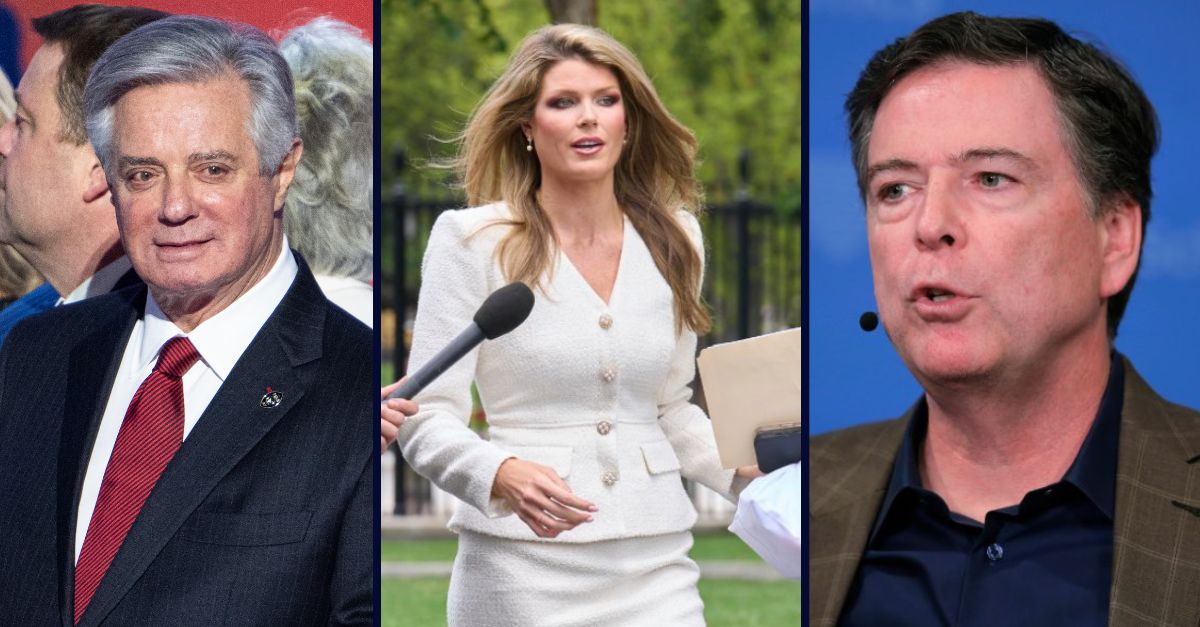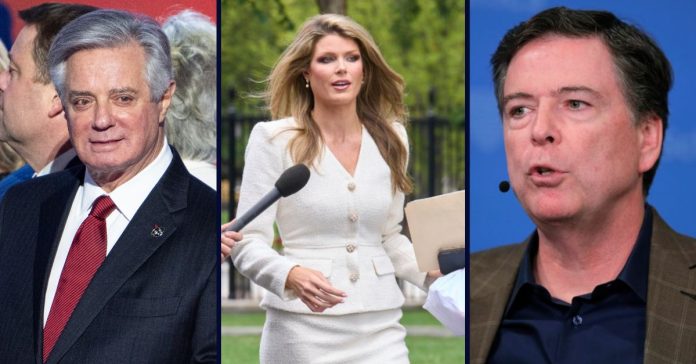
Left: Former Trump campaign manager Paul Manafort stands on stage before the start of the final night of the Republican National Convention in Milwaukee on Wednesday, July 17, 2024 (Bill Clark/CQ Roll Call via AP Images). Center: Lindsey Halligan, special assistant to the president, speaks with a reporter outside of the White House, Wednesday, Aug. 20, 2025, in Washington (AP Photo/Jacquelyn Martin). Right: Former Director of the Federal Bureau of Investigation James Comey gestures while addressing a gathering at Harvard University”s Institute of Politics’ JFK Jr. Forum in Cambridge, Mass., Monday, Feb. 24, 2020 (AP Photo/Charles Krupa).
James Comey’s lawyers defeated the government’s demand for a sweeping protective order, convincing the presiding judge that such restrictions would have “unnecessarily” hindered and delayed the former FBI director’s “ability to defend himself” and prepare for trial.
U.S. District Judge Michael Nachmanoff agreed that ensuring a fair trial is critically important, and even “share[d] the government’s concern regarding the possibility of inappropriate dissemination of sensitive information,” but he decided that the balance tipped in Comey’s favor.
The judge noted that the late U.S. District Judge T.S. Ellis III, Paul Manafort’s trial judge in the Eastern District of Virginia (EDVA), did not sign off on a protective order lacking specificity that would have thrown an “unnecessarily broad cloak of secrecy” over discoverable material in special counsel Robert Mueller’s bank and tax fraud case against the former Trump campaign chairman:
The Court further finds that the government’s proposal does not sufficiently define the information constituting ‘Protected Material,’ thereby making it overbroad. See, e.g., Order Denying Government’s Unopposed Motion for Protective Order, United States v. Manafort, et al., ECF 31, No. 1:18-cr-83 (E.D. Va. Mar. 27, 2018) (Ellis, J.) (denying government’s unopposed motion for protective order covering all discovery produced by government because “the motion is insufficiently specific in describing the information to be subject to the requested protective order, which is, in the circumstances, excessively broad” and “throws an unnecessarily broad cloak of secrecy over documents and information to be disclosed in discovery”).
Manafort, of course, went on to be convicted in the EDVA, received a sentence in 2019 that was criticized as lenient, and then received a pardon from President Donald Trump a year later.
Deputy Attorney General Todd Blanche, a former criminal defense attorney for Trump and Manafort, also helped defeat a New York State mortgage fraud prosecution against Manafort on double jeopardy grounds.
As recently as Monday, Comey’s attorneys Patrick Fitzgerald and Jessica Carmichael told the judge that the protective order sought by interim U.S. Attorney Lindsey Halligan, through North Carolina-based federal prosecutors Tyler Lemons and Gabriel Diaz, was far too broad and applied to “almost all of discovery.”
Love true crime? Sign up for our newsletter, The Law&Crime Docket, to get the latest real-life crime stories delivered right to your inbox
The attorneys bristled at the notion that Comey, a former director of the FBI, “cannot be trusted with receiving discovery in his” false statement and obstruction case despite a “long career of distinguished government service at the highest levels.”
The defense added that the government’s preferred protective order placed Comey at a “severe and unnecessary disadvantage[.]”
Prosecutors had, on the other hand, asserted that the high-profile nature of the case and Comey’s remarks on social media defending his “innocence” made “restricting the use and dissemination of […] discovery” necessary, since both Comey and the prosecution “have an interest in a fair trial with impartial jurors[.]”
Read the protective order that is now in place.

